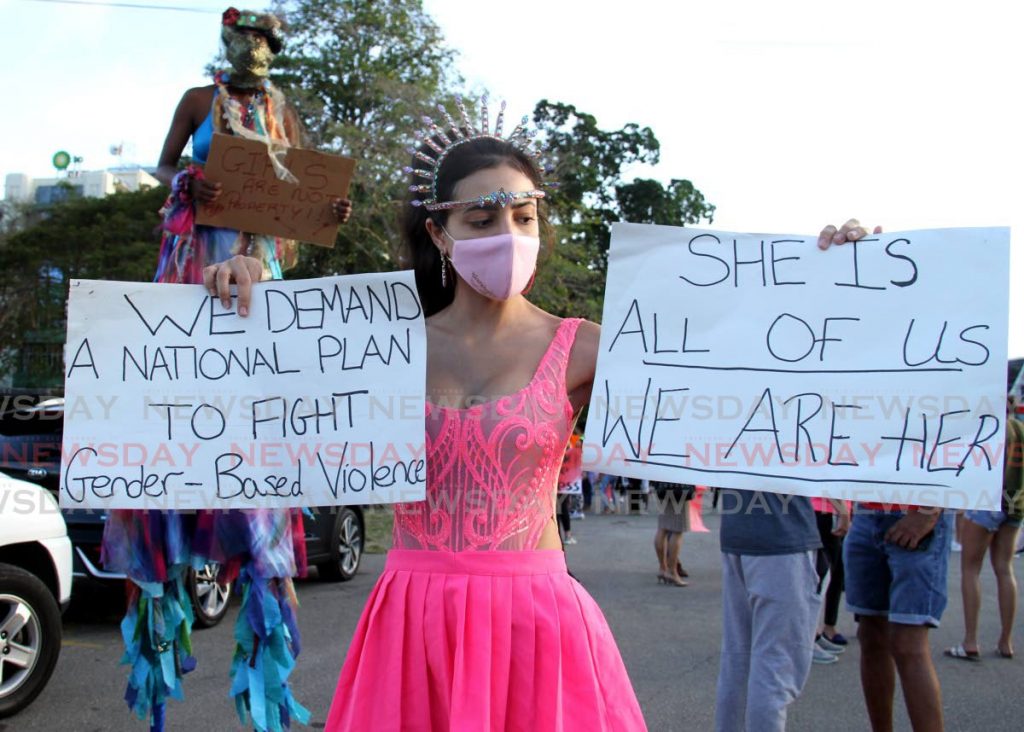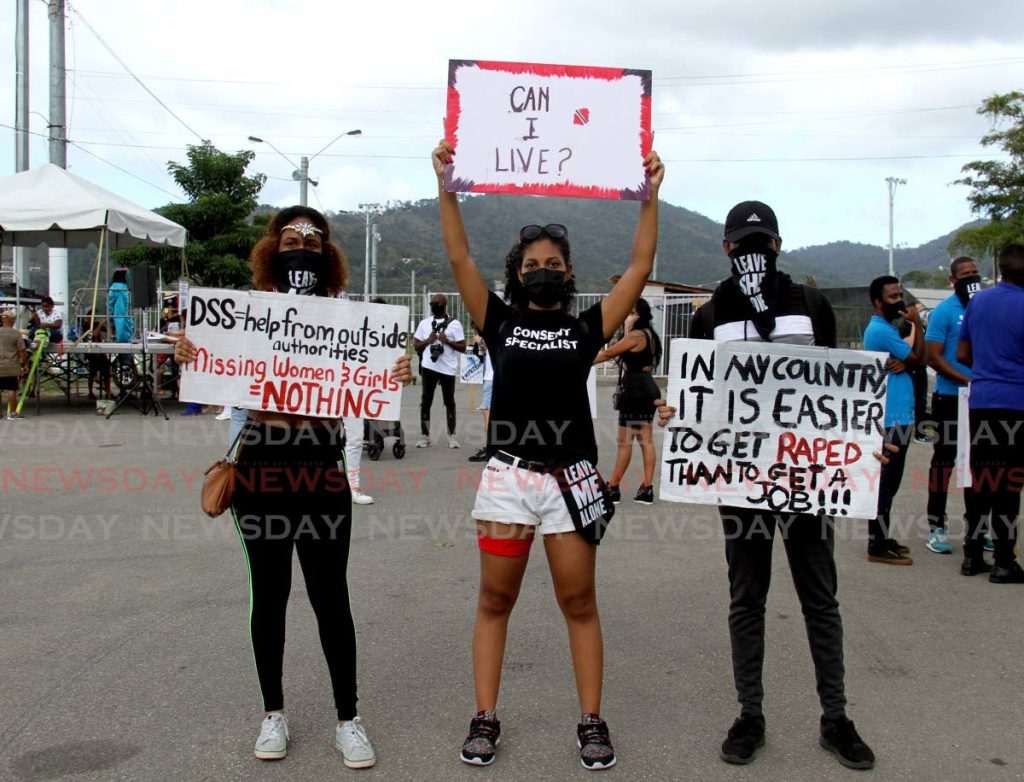Gender experts: Violence costs women their jobs, productivity, financial security

A few days after the decomposing body of murdered law-clerk Andrea Bharatt was found down a precipice in the Heights of Aripo, a woman was held up and robbed by two men on the Aripo junction – an area that hours before had been teeming with police officers and soldiers. The woman, a Cepep worker who lives in Valencia, went to the junction to wait for transportation to go to Aripo village where she was assigned to work. After the attack, the traumatised woman was unable to report to work on that day.
Head of the Institute for Gender and Development Studies (IDGS) Dr Gabrielle Hosein told Sunday Newsday whether a woman is the victim of gender-based violence (GBV) at home, at work, or via a random public act, it is bound to affect her productivity at work.
Women make up approximately 40 per cent of the workforce, and Hosein said, “Women’s productivity is definitely affected by GBV. Up to one third of women in the workforce have experienced intimate-partner-violence at some point in their life. Data shows that these women have higher levels of mental distress at work, higher levels of unspecified bodily pains, and lower levels of confidence as well as lower capacity to concentrate.”

Hosein and IDGS Ignite, a feminist, social-justice undergraduate student-group, along with other groups were among the many voices calling for action following the kidnapping and murder of Bharatt, one of the numerous women in TT who have lost their lives to GBV. They demanded that the government act now on the “crisis.” Among its list of demands were enforcing functional and efficient systems for police prosecutions; appropriate amendments to the Bail Act that support the protection of women and girls; an integrated, resourced and publicly-accountable plan for addressing male violence as it results in threat, fear and harm in women and girls’ lives; and engendered reform to the public transport service to ensure the safety of passengers.
Call for policies that protect
“In addition to the collective statements, we really do want to highlight the issue of transportation. Transportation is a highly-gendered issue, where many women have major safety and security concerns and well as experiences of GBV from drivers of maxis and taxis, including inappropriate conversations, propositions, unwanted touching, etc. Many women are workers and students who have no choice but to use public transportation since it is an issue of affordability and access. Also, persons cannot stay away from work since this will mean a loss of income, which impacts survival and the quality of life for themselves and their families,” IDGS Ignite’s Renuka Anajit told Sunday Newsday.
Bharatt, 23, was last seen alive as she entered a vehicle on King Street, Arima on January 29 on her way home from work. Her body was found a week later – on February 4. Similarly, 19-year-old Ashanti Riley of Lloyd Street, Sunshine Avenue, San Juan left her home on November 29, around 4 pm. She was on her way to her grandmother’s house for a birthday party. CCTV footage showed her getting into a light blue car before she went missing. Her body was found in La Canoa, Santa Cruz on December 4. She had been raped and murdered.

Economist Dr Marlene Attz said GBV, whether physical or psychological, can seriously affect productivity at work, and by extension, job security.
But, she said, “How gender-based violence affects the economic needs of women is not one-dimensional.”
Attz told Sunday Newsday, “There are a whole lot of issues that can arise.” Whether it is a random case, happening at home, if there are children in the home, if the children are the abusers or not, she said, are some of the factors that will determine the action a woman will take in response to GBV.
She said if the woman is employed and is a victim of abuse at home, it is bound to affect the way in which she functions at work. And if a woman is unemployed it means she would most likely have to depend on her abuser for money. “How gender-based violence affects women economically is multi-tiered, and it becomes an additional burden if there are children involved.”
Attz said one of the many fallouts of the covid19 pandemic is that the lockdown has caused the closure of a number of businesses and a reduction in staff of some that managed to keep their doors open. “Many women found themselves unemployed. For some of them work was an escape from abuse at home, so they now found themselves having to spend most of the day in close proximity to their abuser, and dependent on them for financial support. It’s a case where someone has power over you and you have to subject yourself to the abuse because you feel like you have no other choice.”
How violence affects women’s income
In the report on a 2018 Inter-American Development Bank national women’s health survey for Trinidad and Tobago, researchers Cecile Pemberton, Joel Joseph and their team collected information from a randomly-selected sample comprising of 1,905 households. The data collection took place from April to July 2017 and 1,079 women completed the individual interview.
“A quarter of the sample identified as homemakers or unpaid family workers, 17 per cent were unemployed, and three per cent were not part of the workforce,” the report said. Forty-six of the respondents were employed and nine per cent were self-employed. “Only 26 per cent of respondents derived their main source of income from their own earnings. Twenty per cent described their main income as earned by both themselves and their husband/partner, while over half of the respondents were dependent on others for their main income: 26 per cent on their husband/partner, 15 per cent on relatives and friends, and 13 per cent had some ‘other’ form of income such as grants and pensions or no income,” the study found.

As it regards lifetime economic partner violence – violence which can take the form of property damage, restricting access to money and education, preventing a partner from working or non-compliance with financial obligations such as child support – the researchers found that, “Seven per cent of these women reported that their partner refused to give them money for household expenses regardless of money being available for other things; seven per cent indicated partners prohibit them from getting a job, and two per cent stated that their partners took their earnings or savings against their will. Overall, almost 11 per cent of ever-partnered (women between the ages of 15 and 64 who have ever had an intimate partner) women indicated that they experienced economic abuse by partners over their lifetime,” the report said.
They also looked at the impact of gender-based violence on income generation. “Just over a quarter of them (27 per cent) reported that their work was not disrupted. Others described the violence as having the following impacts: loss of self-confidence (ten per cent), needing sick leave (19 per cent), and being unable to concentrate (31 per cent), as well as husband/partner interrupting work (15 per cent).”
Members of IGDS Ignite and the other groups said the abuse of women in TT, in any form, has been going on too long and must stop. In a collective release, they said, “We deserve to live in a country where we are free to live, with the absence of fear for ourselves and those around us.”


Comments
"Gender experts: Violence costs women their jobs, productivity, financial security"